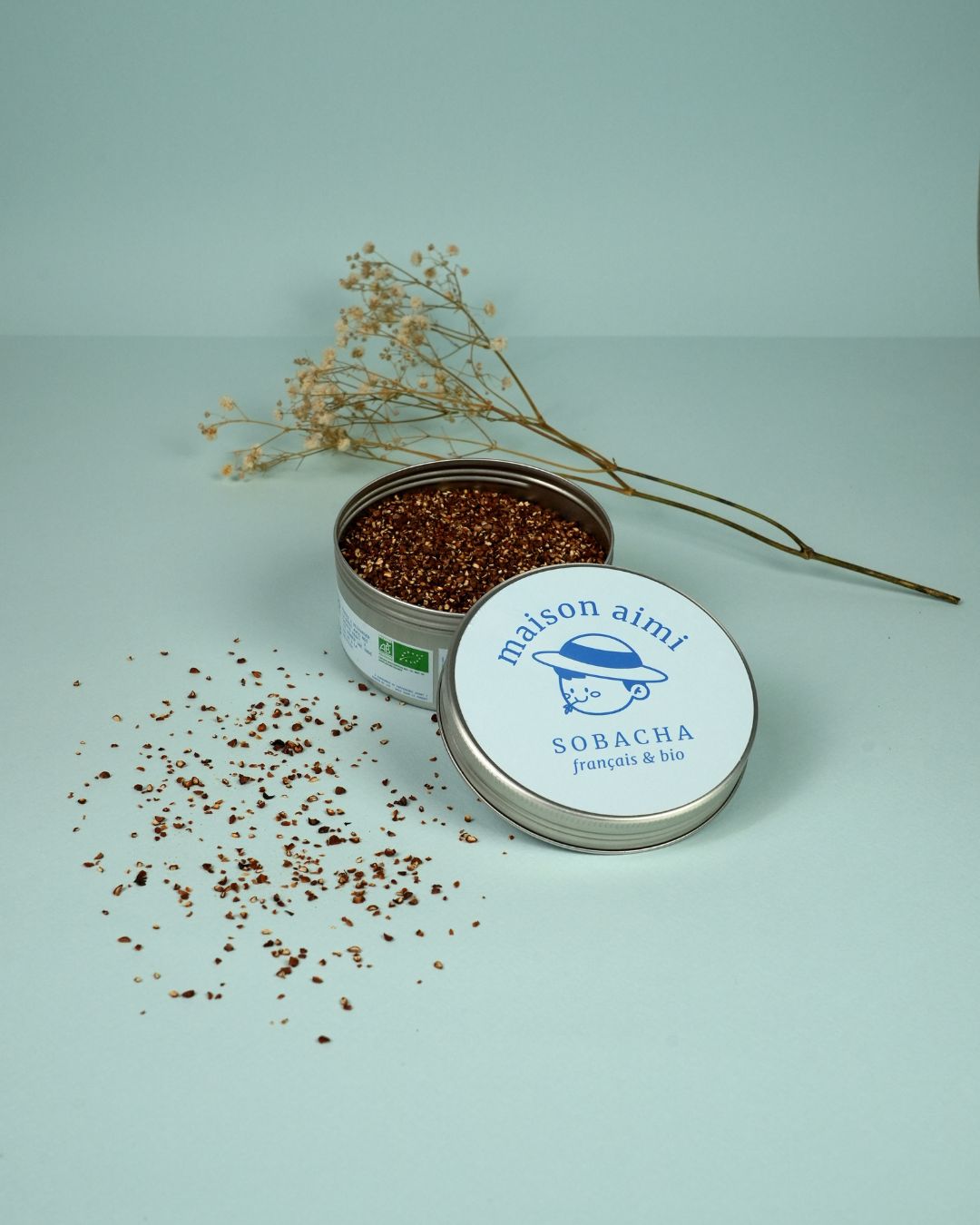How do herbal teas aid digestion?
100% detox herbal tea. Infusion good for digestion. Herbal tea for good intestinal transit. There are many adjectives to talk about the benefits of herbal teas in terms of digestion. But how do herbal teas facilitate digestion? Do they really facilitate it? The water contained in herbal teas, as well as the properties of the plants and the absence of stimulants are particularly interesting for good digestion. Specializing in Japanese cereal infusions (barley and buckwheat), Maison Aimi has conducted extensive research on the benefits of herbal teas and cereals. In this article, we offer you a summary of this research.
SUMMARY
First of all, what is digestion?
Herbal tea water is good for digestion
> How does water participate in digestion?
> Water in herbal tea
Plants and molecules that facilitate digestion
> How nutrients permeate water during an infusion
> Plants and molecules of interest for digestion
Herbal tea, a caffeine-free drink
How do herbal teas aid digestion? FAQ
> What is the difference between herbal tea and infusion?
> When is the best time to drink herbal tea to aid digestion?
> Why do we have digestion problems?
First of all, what is digestion?
Before going further into the benefits of drinking herbal teas to aid digestion, let's start by briefly recalling what digestion is .
Digestion is the internal process of assimilating nutrients : food is transformed into chemical substances and passes through the intestine into the circulation to nourish the body. The remains are eliminated. Digestion begins at the stage of chewing , in the mouth, and ends with the assimilation of interesting elements and the elimination of waste .
Having good digestion is therefore particularly important both to promote your health and to promote your quality of life : who likes bloating and other stomach problems?
Herbal teas and other infusions help with digestion. This is for three reasons that we will discover in detail. On the one hand, water is excellent for digestion and herbal teas make it easier to drink water! On the other hand, the water in herbal teas is boosted by the nutrients in the plants and other infused cereals. Finally, the water in herbal teas does not contain any stimulants, unlike tea and coffee.
Herbal tea water is good for digestion
The human body is composed of 80% water. Good hydration, at a rate of about 1.5 L per day consumed, helps ensure the proper functioning of the body, whether it is cell renewal, skin hydration or digestion. Herbal tea, composed mainly of water, contributes to the proper hydration of the body and thus, to the digestion process.
How does water help digestion?
In digestion, water intervenes at two very different levels:
- Water helps maintain saliva levels: composed of 90% water, saliva helps facilitate the absorption, transport and digestion of ingested food. By transforming food through chewing, saliva acts on the absorption of nutrients. Drinking enough helps support the digestion process.
- Water allows the elimination of waste through urine: less glamorous but essential to understanding the importance of water! Urine, composed of 85% water, allows, through the kidneys, to eliminate metabolic and toxic waste from the body while preserving the mineral salts essential to our health. Hydrating enough helps the kidneys do their daily work.
Water in herbal tea
As we have seen, water is not only good for digestion, it is also essential. It is necessary in the different stages of digestion.
For good hydration of the body, it is important to drink between 1L and 1.5L daily .
In this context, drinking herbal tea is very interesting. Herbal tea is a drink created from the infusion of plants and cereals in hot water. Some properties of the plants, including their taste and color, pass into the water. Drinking herbal tea means drinking improved water , in taste and nutrients.
Plants and molecules that facilitate digestion
Drinking herbal tea is good for digestion is interesting thanks to the water it contains. But not only that. Indeed, herbal tea is endowed with the benefits of the plants that have been infused and these can have a positive impact on digestion. How does it work and which plants and molecules are interesting? Let's talk about it!
How nutrients permeate water during infusion
Before being the name of a drink, the term “infusion” refers to a method of extracting the active ingredients and aromas of a plant by dissolving it in an initially boiling liquid that is left to cool. This liquid is most often water but it can be an oil, alcohol or even milk (in the case of chai latte for example). In the infusion method, the water is most often brought to the boil. This has the advantage of disinfecting the water and the infused plant(s).
Infusion as a method of extracting nutrients from plants has been practiced since ancient times. It is said that the principle of infusion was discovered by the Emperor of China, Shen Nung, in 2737 BC . He realized the interest of the process after seeing a tea leaf fall into his cup of boiling water.
Plants and molecules of interest for digestion
To promote good digestion, several plants and vegetables are highlighted. Containing molecules and nutrients good for digestion, consuming them in herbal tea helps your body to digest better.
Barley and Oats
Barley and oats are two grains that are particularly rich in soluble fiber .
Viscous soluble fiber slows gastric emptying, prolongs small intestinal transit and softens stools, which contributes to intestinal regularity . In addition, soluble fiber has hypocholesterolemic effects, reduces postprandial blood glucose and insulin levels.
Drinking mugicha (barley tea in Japanese) is thus interesting to supplement with soluble fibers while consuming water. It is also these properties that make mugicha an interesting drink for diabetics.
👉 Want to know more about the benefits of mugicha ? Check out our article on the subject!
Carminative foods
Carminative foods are foods that suppress gas and reduce spasms due to poor digestion . They will be particularly interesting to fight against bloating . You will find in particular: fennel, ginger, thyme, sage, tarragon, etc. You can make herbal teas and infusions from these carminative foods.
Herbal tea, a caffeine-free drink
Coffee is often cited among the interesting drinks to facilitate digestion. Just like herbal teas and infusions, it is composed mostly of water and coffee has interesting properties for digestion.
However, the caffeine contained in coffee prevents us from consuming coffee like “water”. Indeed, too much caffeine is harmful to the body: 6 coffees per day drastically increases the risk of cardiovascular accidents . Moreover, coffee drunk on an empty stomach can be acidic and irritate the stomach.
While tea and matcha are less criticized, they are still concentrated in caffeine too (and yes, caffeine and theine are one and the same molecule !). This is why drinking a lot of tea in large quantities and at any time of the day or night is not recommended, especially for children and the elderly.
Unlike these drinks, herbal teas and infusions do not contain caffeine . They can be drunk at noon or in the evening , before or after a meal , without any risk.
How do herbal teas aid digestion? FAQ
What is the difference between herbal tea and infusion?
The term “ herbal tea” includes drinks created using the infusion technique but also traditional techniques such as maceration or decoction.
The term “ infusion” therefore refers to only one of the techniques used to prepare a herbal tea. It simply consists of pouring simmering water over the plants. The infusion time before filtering varies between 5 to 10 minutes depending on the plants, some requiring more time than others to extract active ingredients and flavors.
Other ways to prepare herbal tea are:
- Decoction : This involves steeping the plants in cold water before bringing the mixture to the boil for a longer or shorter time depending on the plants used. As with infusion, the mixture is filtered at the end of cooking. This preparation method allows more molecules to be extracted from the plants; it is more concentrated.
- Maceration : This involves keeping the plant in contact with water at room temperature for a period of 30 minutes to 4 hours. This slower method is less aggressive and produces a more concentrated preparation. Not all plants are suitable for this.
⚡ For an infusion to be effective, do not pour boiling water: some of the active substances in the plant are volatile and could be dispersed by too much steam. Similarly, it is advisable to cover the herbal tea for the entire duration of the infusion.
When is the best time to drink herbal tea to aid digestion?
The best time to drink herbal tea to aid digestion is between meals, ideally half an hour before and an hour after. Drinking during meals dilutes the digestive juices in the stomach, which slows down digestion.
Why do we have digestion problems?
There are many reasons that can cause discomfort during digestion! Digestive problems can be due to:
- The way of eating: too much food, eating too quickly, without chewing enough;
- Lifestyle: a healthy lifestyle – limited alcohol, no smoking, balanced and varied diet, restful sleep, regular exercise – contributes to the proper functioning of your digestive system;
- Stress: For many people, the stomach is the first receptor for stress. It is the first place where we suffer! If you are stressed by bouts of stress or chronic stress, it is possible that you feel it when digesting;
- The menstrual cycle: among premenstrual symptoms, you may be surprised to find bloating and digestive problems!
- Health : various diseases and pathologies can prevent good digestion, such as Crohn's disease, gluten intolerance, stomach ulcers, aerophagia, irritable bowel syndrome, etc. If you think you are suffering from one of these problems, consult your doctor, who will suggest additional tests.
Herbal teas and infusions, because of the water they provide, but also thanks to the nutrients that enrich them, are particularly interesting to facilitate digestion. Barley infusion, rich in soluble fiber, is thus beneficial. Without caffeine, it can also be drunk throughout the day, hot or cold, by young and old!



